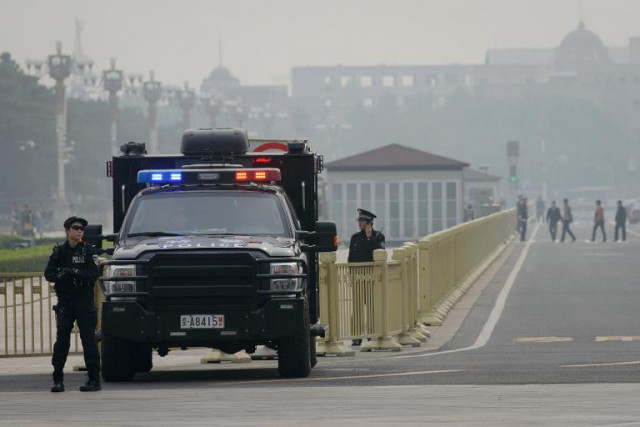China punishes 8 for Xinjiang 'terrorist attacks'
At least one of those executed had been convicted for a suicide car crash in Tiananmen Square.

The announcement by the official Xinhua news agency said the eight were involved in five different cases connected to Xinjiang, where Beijing says separatist militants are behind a string of attacks that have rocked China in recent months.
Xinhua said one of the cases included "the terrorist attack in the Tiananmen Square in Beijing", a reference to a brazen assault last October in the heart of the capital in which a car rammed into people on the iconic square before bursting into flames.
Two tourists were killed alongside the three attackers in an attack that Beijing blamed on Xinjiang separatists.
The Xinhua report did not state how many of the eight executed were convicted in connection with the Tiananmen attack.
The other cases cited included convictions for establishing a terrorist organisation, attacks on police and officials and the manufacture of explosives.
The latest executions underscore the tough approach authorities are taking to increasingly brazen and violent incidents.
The Tiananmen attack was one of several that have rocked China since last year, and which Beijing has blamed on Xinjiang separatists.
The far-western region is the resource-rich homeland of the Uighurs and other groups, and periodically sees ethnic tensions and discontent with the government burst into violence.
In March a horrific knife assault at a railway station in the southern city of Kunming left 29 dead and 143 wounded.
Two months later 39 people were killed, along with four attackers, and more than 90 wounded when assailants threw explosives and ploughed two off-road vehicles through a crowd at an Urumqi market.
Chinese courts, which are controlled by the ruling Communist Party and have a near-perfect conviction rate, frequently impose death sentences for terrorism offences.
The executions and sentencings are part of a crackdown that comes after Beijing vowed a year-long campaign against terrorism in the wake of the Urumqi market attack.
In June, 13 people were executed for Xinjiang linked terrorist attacks.
Beijing does not say how many people it executes each year. But independent estimates put the total around 3,000 in 2012, a figure higher than all other countries combined.
Exile groups say cultural oppression and intrusive security measures imposed by the Chinese government are the main causes of tension, along with immigration by China's Han ethnic majority, which they say has led to decades of discrimination and economic inequality.
Beijing, however, stresses ethnic harmony in Xinjiang and says the government has helped improve living standards and developed its economy.



















COMMENTS
Comments are moderated and generally will be posted if they are on-topic and not abusive.
For more information, please see our Comments FAQ